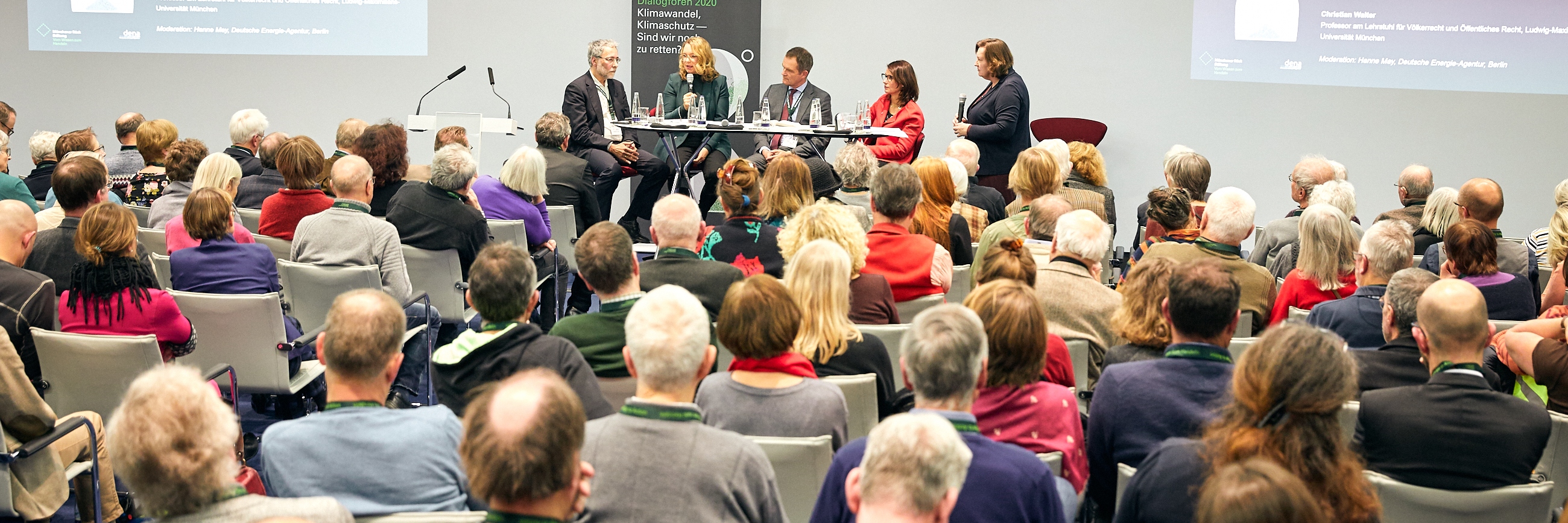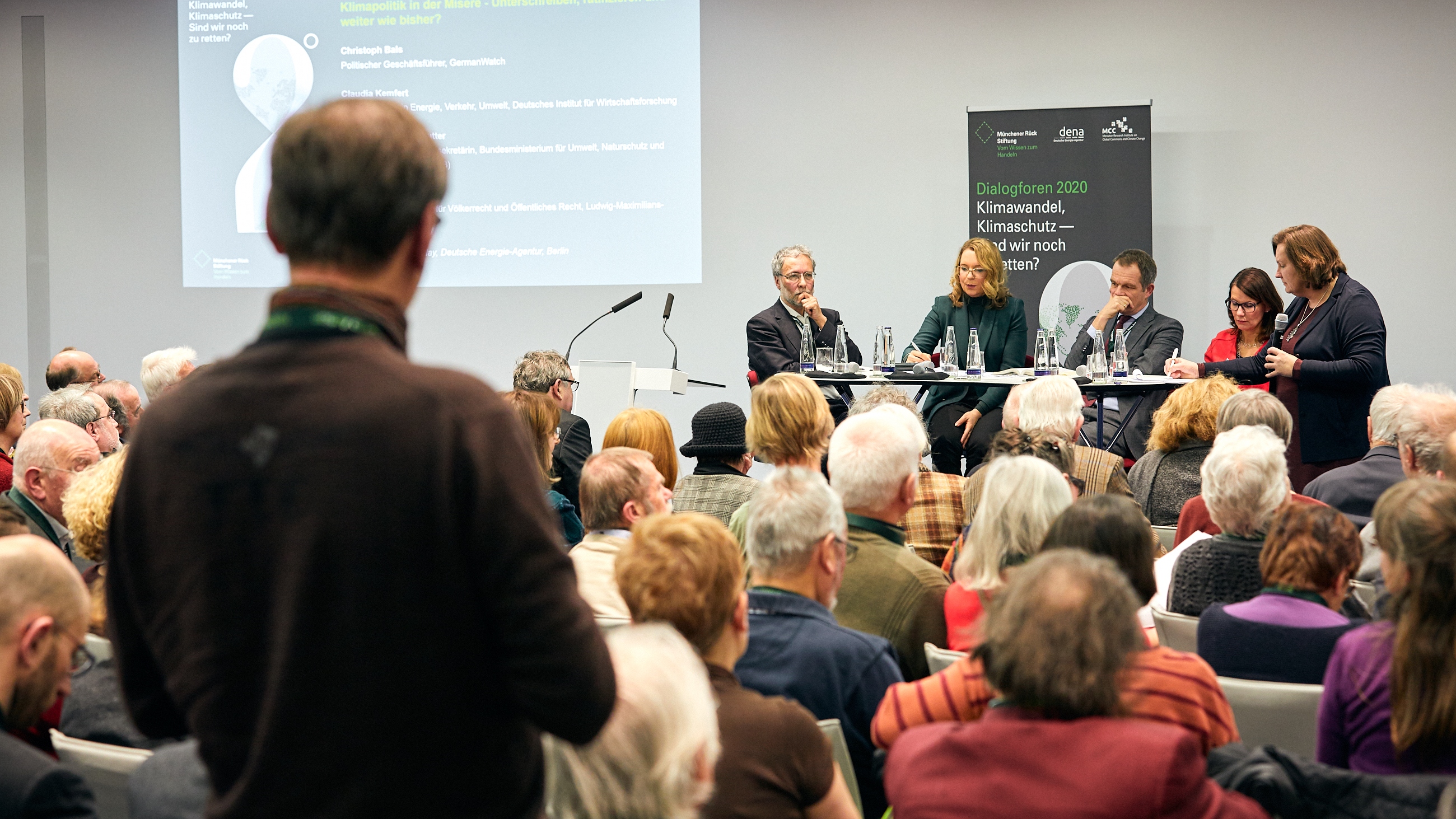
The climate policy dilemma – sign, ratify and continue as before?
Dialogue Forum on 23 January 2020
properties.trackTitle
properties.trackSubtitle
There has been a lot of movement in the climate debate. But even though more and more countries are setting binding targets for CO2 reduction, time is running out. Where does the lack of momentum on the part of national governments come from? And what can pressure from civil society, such as the climate activists of Fridays for Future, do?

Creating a framework for investment
The Game Changer was the Paris Climate Agreement of 2015, Christoph Bals, political director of the development and environmental organization Germanwatch is convinced. However: "At the same time we are in a new phase of serious blockade in climate policy." US President Donald Trump and his Brazilian colleague Jair Bolsonaro are examples of this. "Without pressure from civil society, we have no chance of achieving transformation," Bals believes. Many companies would currently still struggle because their old business model has no future and the framework for investing in a new model is missing.
Climate protection offers enormous opportunities, as Claudia Kemfert from the German Institute for Economic Research (DIW) pointed out: "The necessary investments of billions of euros will create added value and millions of new jobs worldwide. It is certain that the switch to 100 percent renewable energies is technically feasible and economically worthwhile, provided that the political will exists. At the same time, the head of the Energy, Transport, Environment Department at DIW fears that climate change could trigger the next systemic financial crisis. Increasing global warming could lead to catastrophic global effects with correspondingly incalculable financial damage.

"We have no more time to lose, as recent developments show", warned Rita Schwarzelühr-Sutter, Parliamentary State Secretary in the Federal Environment Ministry. She added: "Multilateral solutions are indispensable for a global problem". These multilateral solutions can only ever be based on voluntary action, as Christian Walter, Professor of International Law and Public Law at the Ludwig-Maximilians-Universität explained. International law could not force states to protect the climate. "If the 1.5 degree target in the Paris Agreement had been made binding for everyone, many states would not have ratified the Agreement in the first place," Walter is certain. So now each country must decide for itself what efforts it wants to make to protect the climate. However, the plans of most states are still far from sufficient to slow down the accelerating global warming. "There is a big gap that will lead to a warming of more than three degrees if the targets are not improved", Germanwatch director Bals pointed out. This also applies to the climate package in Germany.

Reduction of emissions in transport urgently needed
The transport sector is particularly problematic here, with emissions remaining at 1990 levels. "Because more and more highly motorized cars are driving on the roads, the efficiency effects of more economical engines are more than offset," explained Kemfert. We should have and could have changed course much earlier. The German government's Council of Economic Experts had already called for a reduction in traffic 47 years ago. "There are many great things you can do, for example strengthening local public transport, promoting e-mobility or expanding cycle paths. Far too little is happening in Germany," she criticized.
However, it is not possible to continue as before. "The goal of reducing CO2 emissions by as much as 55 percent by 2030 compared to 1990 is now set. Each department must produce certain annual results," the State Secretary for the Environment made clear. If the targets are not met, the department must take additional measures. "The holy cow speed limit would have many advantages: Less emissions, more safety on the roads. You could kill many birds with one stone", Kemfert is sure. The distance rules for the construction of new wind turbines are also a thorn in the side of the DIW expert. "Even if it's an emotional topic, you have to get on it right now because we need more renewable energy, also in Bavaria".
"Without the expansion of wind energy, we will never reach the targets for 2030," Bals added. He attested to the lack of seriousness and courage on the part of politicians in implementing the CO2 targets. "Environment and economics ministries often step on each other's toes. We must not talk around the conflicts, but tackle solutions." "Climate protection is a task for society as a whole," replied Schwarzelühr-Sutter. And despite all the assertions, there is no consensus in society when it comes to people making their own contribution. "The spirit is willing, but the flesh is weak," she concluded. "Without sacrifice it is not possible, that must be made clear to the citizens and that is part of honesty", Bals demanded.

Lawsuit before the Federal Constitutional Court
Could we perhaps use legal action to make politicians more accountable? In the Netherlands, the Supreme Court has already committed the government to more climate protection. "The implementation of targets that a government has set itself is actionable," explained international law expert Walter. However, he is sceptical about lawsuits that are based on general human rights norms such as the right to life. For the court could say that something has to be done, but not exactly what. "Otherwise we will have a problem with legitimacy when judges move into the executive branch".
In the meantime, environmental associations in Germany have moved before the Federal Constitutional Court in Karlsruhe because they consider the climate protection law passed in autumn 2019 to be insufficient. "Germanwatch supports the lawsuits," says Bals. However, it is not yet certain whether they will actually be accepted by the court. The big question of legitimacy with regard to climate change, says Bals, is that it mainly affects the young and the next generations as well as the poorest in the developing countries. But they do not have the right to vote. "A Council for Intergenerational Justice, which questions certain political decisions or laws, could help", said Kemfert. But one had to remain within the democratic framework. "We need democratic majorities and must negotiate solutions politically. We must not change that, no matter how important the goal is," Walter added. So we will have to be prepared for the fact that not only society as a whole, but each and every one of us will have to constantly question and, if necessary, change our behavior.
**************************
The Dialogue Forum "The climate policy dilemma – sign, ratify and continue as before?" on 23 January 2020 was organised in Munich by the Munich Re Foundation together with the German Energy Agency (dena), Berlin. The event was moderated by Hanne May from dena. The next event in the series will also take place in Munich. On 18 February, we will meet to discuss " Mobility tomorrow – Emission-free travel powered by electricity and hydrogen?”